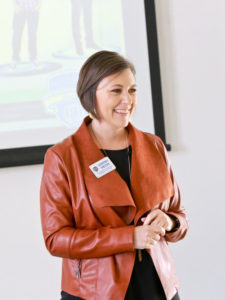What Is The Camak Core and Why Is It Important? Five Burning Questions with Courtney Shelton
By Lisa Mincey Ware
This article appeared originally in the Fall 2019 issue of Frontiers Magazine.
SMC’s Camak Core is an innovative career preparation program at the heart of SMC’s new Bachelor’s Degree. We asked Courtney Shelton, Vice President for Professional Development and Design and Coordinator of the Camak Core, to answer five burning questions about the new program.

Q1: Let’s start with the basics. What is the Camak Core?
Courtney: “The Camak Core is a group of six classes that give students skills they need to succeed in the workplace. It’s named in honor of SMC’s founder, Dr. David English Camak. SMC’s bachelor’s degree requires students to choose two concentrations instead of majors. They can choose two from business, English, history, or religion. The Camak core is their third required concentration, and all B.A. degree students will take Camak Core courses, which start in their junior year.”
Q2: What kind of skills will they learn?
Courtney: “I made a list of them for the sidebar of this article — check them out! These are the skills employers have noted, in national surveys and in conversations with us, that most college students don’t have but need in order to be job ready. The skills aren’t specific to any particular major, field, or career, and they’re collectively known as soft skills.”
Q3: Won’t students learn the soft skills they need on the job?
Courtney: “Sure, they can learn soft skills on the job, but it can take much longer and be much harder. The reason is because soft skills are often attitude- and behavior-based. If a soft skill doesn’t come naturally to a student, it can take a lot of practice and reinforcement to master it. But if SMC students can show an employer they’ve already mastered those skills, employers know they’ll contribute to the organization faster and at a higher level than most recent college grads — and that makes our students much more competitive for the best careers at the best starting pay.
“We’re trying to help our students understand that just getting the degree doesn’t guarantee success, even though it was probably enough for their parents or grandparents. Workplace expectations are incredibly different these days, and we want them to learn the difference between college skills and workplace skills before they graduate and start their first jobs.”
Q4: So, what’s the difference between college skills and workplace skills?
Courtney: “I’m glad you asked! Surveys tell us that employers want to hire graduates with the soft skills we’re teaching in the Camak Core, but most colleges still focus on teaching academic skills only. And that was fine for the last 500 years, but we know that most students go to college today because they need a degree to pursue a career. For most of their lives, students are taught that good grades equal success. And of course, earning great grades is an accomplishment that should be valued and celebrated. What’s not working so well anymore is that after college, plenty of successful students struggle to find a great job or don’t earn promotions because maybe they can’t work well in a team. Or maybe they can’t accept criticism, or they can’t solve a problem without their supervisor telling them every step to take. Suddenly, these successful students aren’t successful employees and so, understandably, they feel like their college took their money without preparing them.
Q5: Why is the Camak Core a requirement of SMC’s bachelor’s degree?
Courtney: “As a College, SMC decided soft skills were so valuable for our students that it would be irresponsible of us, as educators, not to teach them. Most schools offer some form of career preparation, but it’s nearly always optional. We’re requiring it, and no other liberal arts college is requiring it at the level we are, because we believe teaching soft skills along with academic skills will guarantee our students are as prepared as possible to be successful in their first job and in every other job after graduation. Also, college is, in many ways, the best place to practice these skills. If you’re going to make mistakes that could keep you from getting a great job or that will set you back in your career, we want our students to make those mistakes on a Camak Core project so they can learn from them before it has real-world consequences.”
